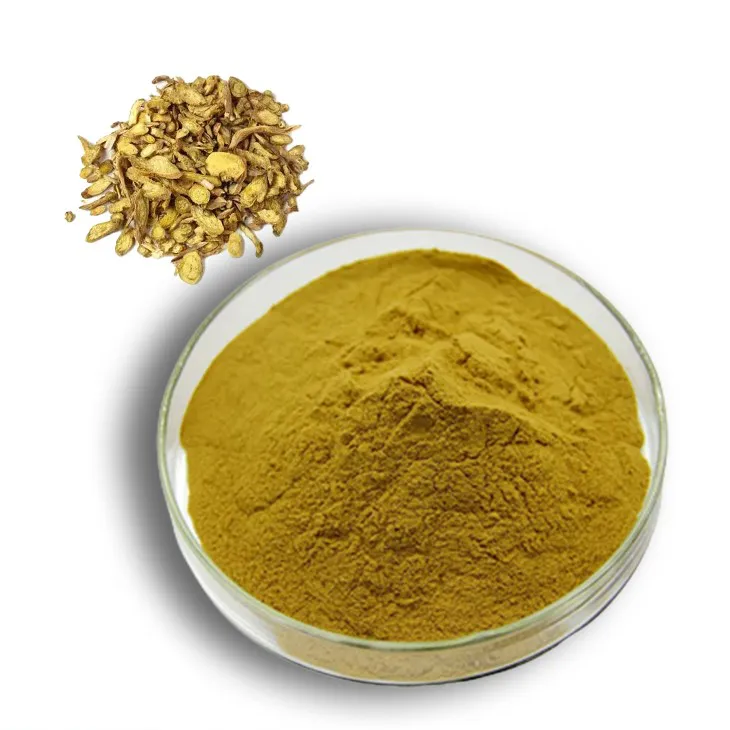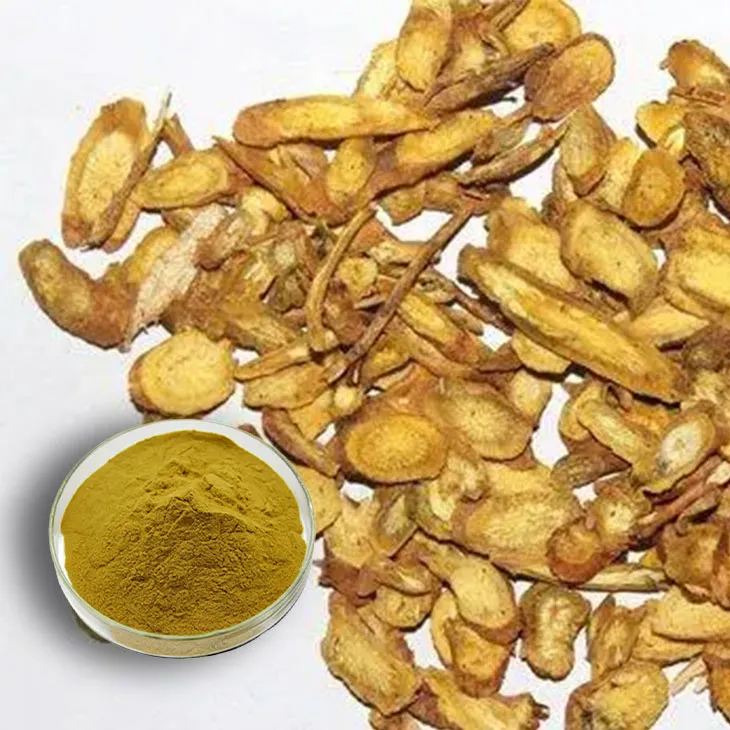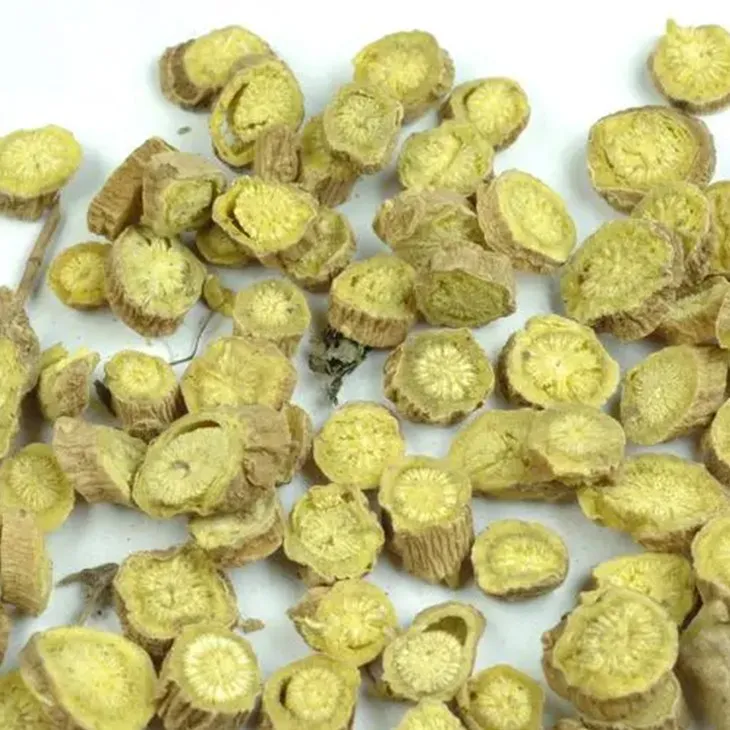- 0086-571-85302990
- sales@greenskybio.com
Baicalin - A Natural Ingredient in Anti - aging Skin Care Products.
2024-11-11

1. Introduction to Baicalin in Anti - aging Skin Care
In the realm of anti - aging skin care, the search for effective and natural ingredients is ceaseless. Baicalin has emerged as a remarkable contender in this pursuit. Baicalin is a bioactive compound that has captured the attention of researchers and the skin care industry alike due to its multiple beneficial properties for the skin. It is sourced from natural plants, making it an appealing option for those who prefer natural - based skin care products.

2. The Antioxidant Power of Baicalin
Antioxidants play a crucial role in anti - aging. Our skin is constantly exposed to various environmental factors such as ultraviolet (UV) radiation, pollution, and toxins. These factors generate free radicals, which are highly reactive molecules that can cause significant damage to skin cells.
Baicalin's antioxidant capabilities are of great significance in combating this damage. Free radicals have unpaired electrons, which makes them unstable and eager to react with other molecules in the skin cells, like lipids, proteins, and DNA. This reaction can lead to a breakdown of the cellular structure and function, resulting in premature aging signs such as wrinkles, fine lines, and dull skin.
Baicalin can donate electrons to these free radicals, neutralizing them and preventing them from causing further harm. By doing so, it helps to slow down the aging process at the cellular level. This antioxidant activity not only protects the skin from external aggressors but also helps in maintaining the overall health and vitality of the skin cells.

3. Baicalin and Gene Expression in Skin Aging
Skin aging is a complex process that involves the regulation of numerous genes. Some genes are directly involved in processes that contribute to aging, such as cell senescence (the process by which cells lose their ability to divide and function properly) and extracellular matrix degradation (the breakdown of the substances that hold skin cells together).
Baicalin has shown the potential to modulate the expression of these genes in a favorable way for the skin. Through various cellular mechanisms, it may be able to influence how these genes are turned on or off. For example, it could potentially suppress the genes that promote cell senescence, allowing skin cells to maintain their normal functions for a longer period.
Additionally, by regulating genes related to extracellular matrix degradation, baicalin may help in maintaining the integrity of the skin structure. A well - maintained extracellular matrix is essential for skin firmness and elasticity, which are both important aspects of youthful - looking skin.

4. Baicalin's Role in Skin Hydration
Skin hydration is a key factor in maintaining a youthful appearance. Well - hydrated skin appears plump, smooth, and radiant, while dehydrated skin is more prone to developing wrinkles and looking dull.
Baicalin has demonstrated some promising effects in improving skin hydration. It can help the skin to retain moisture in several ways. One possible mechanism is by enhancing the function of the skin's natural barrier. The skin barrier is responsible for preventing water loss from the skin surface. If this barrier is compromised, the skin becomes more vulnerable to drying out.
Baicalin may also play a role in increasing the production of certain molecules in the skin that are involved in water retention, such as hyaluronic acid. Hyaluronic acid has the ability to bind large amounts of water, keeping the skin hydrated and supple. By promoting the production or function of such molecules, baicalin helps to prevent the formation of wrinkles that are often associated with lack of hydration.

5. Baicalin in Anti - aging Skin Care Products
Given its multiple beneficial properties, baicalin has become a valuable component in anti - aging skin care products. It can be found in a variety of formulations, including creams, serums, and lotions.
5.1. Creams
Anti - aging creams containing baicalin are designed to be applied topically to the skin. These creams often combine baicalin with other beneficial ingredients such as vitamins, peptides, and plant extracts. The baicalin in the cream helps to protect the skin from free radical damage, regulate gene expression related to aging, and improve skin hydration. When applied regularly, these creams can contribute to a reduction in the appearance of wrinkles, fine lines, and an overall improvement in skin texture.
5.2. Serums
Serums are highly concentrated formulations that are often used to target specific skin concerns. Baicalin - containing serums are popular in anti - aging skin care. They can penetrate deeper into the skin compared to creams, delivering a higher concentration of baicalin directly to the skin cells. This allows for more effective antioxidant protection, gene regulation, and hydration improvement. Serums are usually applied before creams to maximize their benefits.
5.3. Lotions
Anti - aging lotions with baicalin are lighter in texture compared to creams. They are suitable for those with normal to oily skin types. The baicalin in lotions provides the same anti - aging benefits as in creams and serums, including antioxidant action, gene modulation, and skin hydration support. Lotions are easy to spread and are quickly absorbed by the skin, leaving it feeling refreshed and hydrated.
6. Research and Future Prospects
Although there has been significant research on baicalin's role in anti - aging skin care, there is still much to be explored. Future research may focus on further elucidating the exact mechanisms by which baicalin modulates gene expression related to skin aging. Understanding these mechanisms in more detail could lead to the development of more targeted and effective anti - aging products.
Additionally, researchers may investigate the potential of baicalin in combination with other emerging anti - aging ingredients. Combining baicalin with other bioactive compounds could potentially enhance its anti - aging effects or provide additional benefits for the skin.
There is also a need for more long - term studies on the safety and efficacy of baicalin in anti - aging skin care products. While initial research has shown promising results, longer - term studies are necessary to ensure that baicalin - based products are safe for continuous use and that they provide consistent anti - aging benefits over time.
7. Conclusion
In conclusion, baicalin is a natural ingredient with great potential in anti - aging skin care. Its antioxidant properties, ability to modulate gene expression related to skin aging, and role in skin hydration make it a valuable addition to anti - aging skin care products. As research continues to unfold, we can expect to see even more innovative uses of baicalin in the pursuit of youthful and healthy - looking skin.
FAQ:
What is baicalin?
Baicalin is a bioactive compound. It has several important properties that make it valuable in anti - aging skin care, such as antioxidant capabilities, the ability to modulate gene expression related to skin aging, and potential for improving skin hydration.
How does baicalin contribute to anti - aging?
Baicalin contributes to anti - aging in multiple ways. Its antioxidant capabilities help counteract free radicals that attack skin cells and cause deterioration over time. It can also regulate genes related to skin aging processes like cell senescence and extracellular matrix degradation. Additionally, it helps improve skin hydration, which is important for maintaining a youthful appearance as well - hydrated skin looks plump and reduces the formation of wrinkles.
Why is baicalin considered important in skin care products?
Baicalin is considered important in skin care products because of its multiple beneficial effects on the skin. It combats the signs of aging through antioxidant action, gene regulation, and hydration improvement. These effects help keep the skin looking younger, healthier, and more vibrant, which are the main goals of anti - aging skin care products.
How does baicalin help with skin hydration?
Baicalin helps the skin retain moisture. By doing so, it prevents dryness and the formation of wrinkles that are often caused by lack of hydration. This results in the skin looking plump and more youthful.
Can baicalin really regulate genes related to skin aging?
There is evidence suggesting that baicalin may be able to regulate certain genes related to skin aging. These genes are involved in processes such as cell senescence and extracellular matrix degradation. However, more research is still needed to fully understand the mechanisms and the extent of this gene - regulation ability.
Related literature
- The Role of Baicalin in Skin Health and Anti - aging"
- "Baicalin: A Promising Ingredient for Skin Care - An Overview"
- "Antioxidant and Anti - aging Properties of Baicalin in Dermatology"
- ▶ Hesperidin
- ▶ citrus bioflavonoids
- ▶ plant extract
- ▶ lycopene
- ▶ Diosmin
- ▶ Grape seed extract
- ▶ Sea buckthorn Juice Powder
- ▶ Beetroot powder
- ▶ Hops Extract
- ▶ Artichoke Extract
- ▶ Reishi mushroom extract
- ▶ Astaxanthin
- ▶ Green Tea Extract
- ▶ Curcumin Extract
- ▶ Horse Chestnut Extract
- ▶ Other Problems
- ▶ Boswellia Serrata Extract
- ▶ Resveratrol Extract
- ▶ Marigold Extract
- ▶ Grape Leaf Extract
- ▶ blog3
-
High purity olive leaf extract
2024-11-11
-
Lavender oil extraction method
2024-11-11
-
100% organic virgin sea buckthorn fruit oil
2024-11-11
-
Lotus leaf extract powder factory in China
2024-11-11
-
China aged garlic extract supplier
2024-11-11
-
Deer antler extract powder manufacturer
2024-11-11
-
Saw palmetto extract vs whole herb
2024-11-11
-
Alfalfa Meal
2024-11-11
-
Sophora Flavescens Root Extract
2024-11-11
-
Tongkat Ali Extract Powder
2024-11-11
-
Quercetin
2024-11-11
-
Mangosteen extract powder
2024-11-11
-
Dandelion Leaf Extract
2024-11-11
-
Hericium erinaceus extract powder
2024-11-11
-
Cactus Extract
2024-11-11
-
Red Date Extract
2024-11-11
-
Beetroot Powder
2024-11-11





















